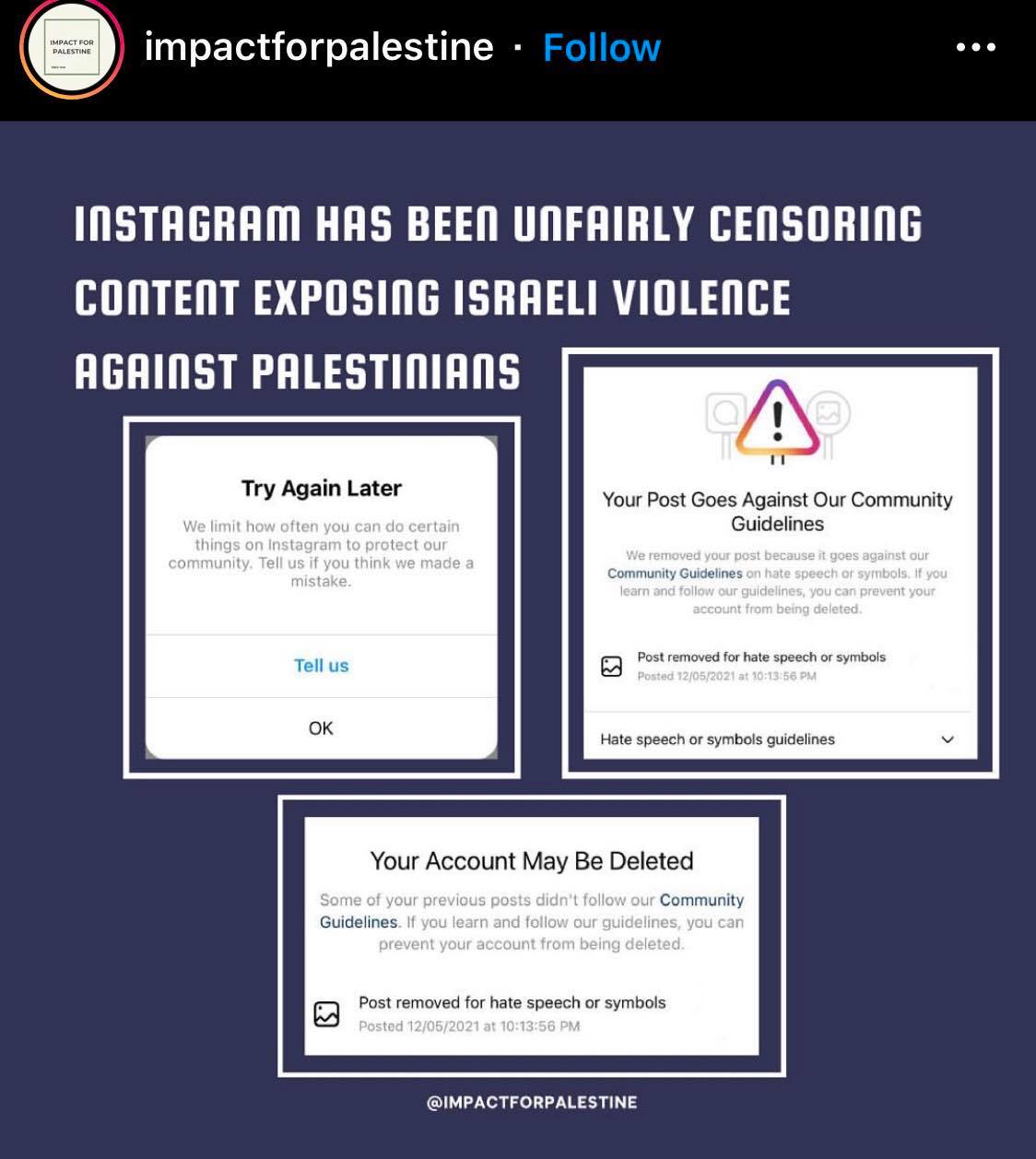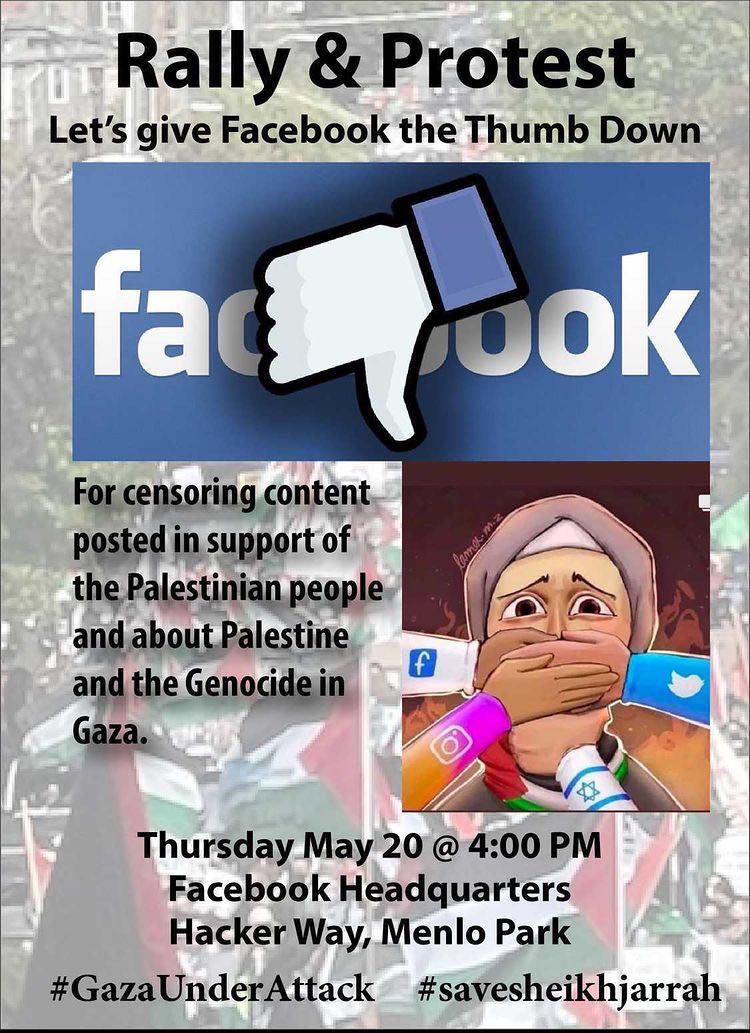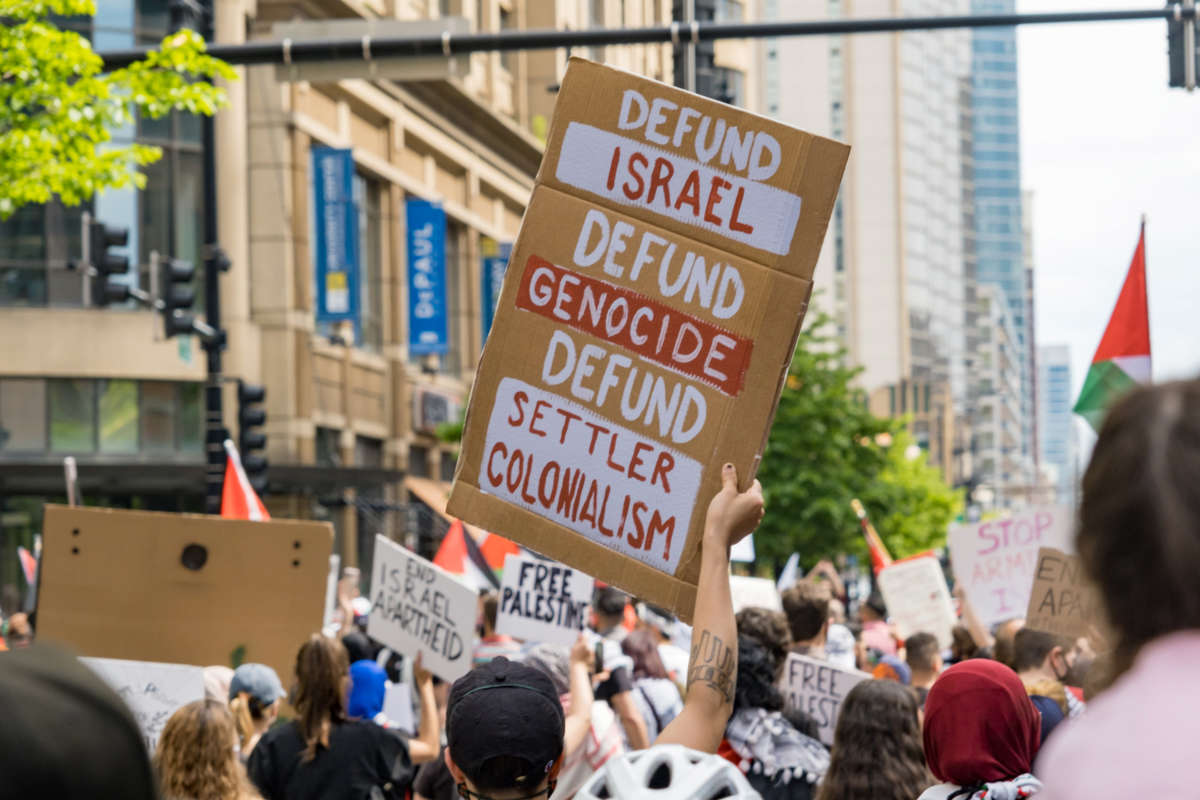Part of the Series
Struggle and Solidarity: Writing Toward Palestinian Liberation
As many sectors of our society are celebrating the “ceasefire” between Palestine and Israel, a chorus of Palestinian voices are blasting across social media echoing a shared consciousness that this ceasefire could never be enough. It is not only recent events but what Palestinian historian Sherene Seikaly explains as the century-long struggle to remain on one’s land in the face of persistent ethnic cleansing that inspires this sentiment.
Since early May, through massive air and ground strikes and ongoing land theft, Israel has killed hundreds of Palestinians, including 63 children. The Israeli state has wounded over 1,500, displaced more than 58,000 Palestinians, and destroyed or badly damaged nearly 450 buildings in the Gaza Strip, including medical centers that serve large segments of the population and provide COVID-19 testing and support. In the midst of this horrific attack, the U.S. blocked three United Nations Security Council resolutions, giving Israel permission to continue besieging the Gaza Strip, while President Biden agreed to continue providing $735 million in weapons to Israel.
The corporate media continues its egregious complicity in these horrors, either by portraying Israel as the victim or misrepresenting the Palestinian struggle as a conflict in which “two equal sides” have been fighting for centuries. Meanwhile Zionist advocates in a variety of spheres are seeking to censor even the slightest gesture of solidarity with Palestinian liberation.
Their primary tactic is to equate critiques of Israeli state violence with antisemitism, as if criticizing state violence is a racist act against Jewish people. (Many Jewish anti-Zionists have pointed out that this conflation of Jewish people with Zionists is itself anti-Semitic.) This strategy has taken a heavy toll, first and foremost, on Palestinian people bearing the brunt of Israeli state violence. It also targets the everyday lives of Palestinian and Arab activists in the U.S., many of whose lives have been devastated by such baseless targeting.

Zionist institutions and advocates, in conjunction with most U.S. elected officials and the corporate media, set up the terms of a debate that ultimately blames the victim. Beyond the charge of “antisemitism,” Zionist colonialist strategies delegitimize critics of Israel by publicly portraying them as supporters of “terrorism” and reframing Palestinian self-defense through the racist trope of violent Arab/Muslim “savagery.”
This is why, through political organizing and activism, teaching, writing, public conversation and debate, social media, and anywhere opportunity arises, solidarity with Palestinian decolonization requires mainstreaming the necessity of Palestinian liberation as a social justice, human rights, decolonial and feminist freedom struggle. Committing to solidarity also necessitates refusing to debate on terms set up by the Zionist, pro-Israeli U.S. status quo.
Instead, we must affirm the full demands of the Palestinian people. These demands include, for instance, engaging in boycott, divestment and sanctions (BDS) on Israel until Palestinian refugees and their descendants achieve the right of return, and until Israel ends its occupation and colonization of Palestinian lands; lifting the siege on Gaza; dismantling the Apartheid Wall; ending the Israeli military occupation of the West Bank and Gaza; releasing all Palestinian political prisoners; and increasing Palestinian access to resources like employment, medical care, food, electricity and water.
Yet most U.S. public debate strives to corner Palestinians, Arabs and our allies into discussing sensationalist racist topics in order to push the just cause of Palestine out of public view. At events, on social media and through the violent emails we receive, advocates for justice for Palestinians, especially Palestinians themselves, are consistently met with silencing, racist and hateful questions about topics like “Palestinian terrorism” or “Arab antisemitism.” Such attacks often rely upon dishonest questions about why, for example, Palestinians “voluntarily” left Palestine or “rejected” a “peace process” (which, in reality, was meant to normalize colonization). Behind the scenes, pro-Israeli advocates use these framings to target, censor, surveil and threaten anyone and everyone who criticizes Israel, especially Palestinians and especially youth and students, working-class folks, immigrants and refugees, and people lacking job security.
To be sure, Hamas has fired rockets into Israel. Yet when it comes to Hamas, what we really need to be asking is not a set of intentionally provocative abstract moral questions about whether or not we agree with violent armed resistance (implying the racist idea that “all Palestinians and Arabs support violence”) but what the historical and political conditions are that have produced that resistance. We also need to consider what the asymmetry of violence, including the 10 to 1 disparity in casualty figures, reveals about the asymmetry in the balance of powers between Palestinians and Israelis.
The time is now for the hundreds and thousands of people who have now registered their solidarity by wearing a kuffiya or waving a Palestinian flag on the streets to continue joining Palestinian-led actions, supporting Palestinian social movements and speaking out, in the loudest terms possible, about the necessity of Palestinian liberation — at work, at home, in the news, through writing, in the classroom, at board meetings, among administrators and elected officials, in our unions, on social media, podcasts, chat rooms, and in the intimate spaces of family and home.
From the 1948 territories to Gaza, the West Bank and to the diaspora, Palestinians are united in protest against Israel’s agenda to displace and dispossess them in order to create a Jewish-majority state in what was, and once again is or will soon be, a Palestinian Arab-majority country. Their resistance offers up a choice between breaking the code of silence and growing the movement to free Palestine, or remaining complicit in the Zionist project of ethnic cleansing.

Reframing the Narrative for Palestinian Liberation
In breaking the silence, we must make our points clear. Here are five facts to emphasize in communicating the realities of Israel’s violence and the urgent goal of Palestinian liberation.
First and foremost, Israel is a settler-colonial state committed to displacing Indigenous Palestinian people from their land and replacing them with primarily European Israeli Jewish settlers. Consider the planned ethnic cleansing of Palestinians that underlined the creation of the state of Israel in 1948. Early Zionists, using the term “transfer,” affirmed loud and clear that their plan was to settle on the land along with large-scale transfer and removal of the Indigenous Palestinian Arabs. On May 14, 1948, when the state of Israel was declared, more than 200 Palestinian villages had already been destroyed and emptied. The massacres, like that of Deir Yassin, accompanied by rape and imprisonment, will never be forgotten. Ultimately, over 500 Palestinian towns and villages were destroyed.
With the creation of the Israeli state or what Palestinians and Arabs call Al-Nakba (“the Catastrophe”), came the displacement of 500,000 Palestinians from their homes. Seventy-three years later, after massive Israeli expansion, the current number of Palestinian refugees exceeds 7 million. The current struggle of Sheikh Jarrah is not what U.S. and Israeli corporate media are calling a “real estate dispute” but a continuation of Israeli colonization that includes eliminating Indigenous Palestinians from their homes in Jerusalem and replacing them with Jews.
As we recognize Israel’s settler-colonial violence against Palestinians in Jerusalem and Gaza, we must also consider the West Bank — land international bodies determined to be controlled by Palestinians. In reality, Israel controls 60 percent of the West Bank and has divided the land up into what closely resembles Swiss cheese. Throughout the West Bank, there are more than 700 road obstacles and 140 Israeli checkpoints. Israeli settlers who have taken over Palestinian land in the West Bank total more than 450,000 (and 220,200 in East Jerusalem). An apartheid wall, which has transformed Palestinian neighborhoods into bantu stands, stretches throughout more than 700 kilometers, not to mention the 700 Israeli military road obstacles across the West Bank.
This is not a “conflict between two equal sides”; it is an asymmetrical relationship between colonizer/colonized and occupier/occupied.
Second, there is not one, but three groups of Palestinians. The U.S. and Israel would like us to believe that there is only one group of Palestinians, those living in the Palestinian West Bank and Gaza. That’s because, in addition to efforts to cleanse the West Bank and erase Gaza out of existence, Israeli settler colonialism also attempts to erase the second group of Palestinians, those who remain inside Israel, by naming them “Arab Israelis.” They also want to erase the struggle of the third group, the 7 million Palestinian refugees who represent the struggle to return home. Ironically, Zionists often refer to the right of Palestinians to return as an attempt to “destroy Israel,” even though anyone who is Jewish has the birthright to settle in Israel. To be sure, the return of Palestinian refugees would alter the nature of the Israeli state, which is colonialist, racist and exclusionary.
Third, similar to the way U.S. white supremacy operates, Israel is an exclusionary racist state created for white European Jews. Its “ Jewish-only” nature, rooted in white supremacy, legitimizes Israel’s racist treatment of Jews of color, its treatment of non-Jews as second-class citizens within Israel, and its targeting of Palestinians as people to be eliminated. We must firmly put forth a counternarrative that refuses the “white man’s burden” that many elected Israeli and U.S. officials have been repeating for decades — a narrative that pretends Israel is “the only democracy in the Middle East,” a “safe haven” in a region full of “savages.”
Fourth, the struggle to free Palestine is a struggle against U.S. imperialism. The U.S. unconditionally supports Israeli colonization with $3.8 billion per year. While many U.S.-based activists tend to treat Palestine as an island, ignoring Israel’s historical occupation of South Lebanon, Syria’s Golan Heights and Egypt’s Sinai Peninsula, the struggle over Palestine has long been part of an Arab, Iranian and North African regional struggle against European and U.S. empire, specifically, the misogynist, expansionist, hypermilitarized, U.S. settler-colonial war machine currently waging a regional “war on terror” that finds its perfect ally in Israel.
Fifth, U.S.-based pro-Israeli advocacy organizations are a key pillar maintaining Israeli settler-colonialism. They pay billions of dollars to repress criticism of Israel. These groups, in partnership with university officials and government officials, falsely accuse supporters of Palestinian liberation of “antisemitism” and “support of terrorism.” They intervene in democratic processes, hiring, tenure cases, K-12 curriculum, the corporate media, social media censorship, immigration cases, and more, devastating the lives of primarily Palestinian advocates (as well as other Arabs and their allies) in the U.S. In the case of the University of Illinois’ firing of tenured Professor Steven Salaita for tweeting his outrage over the 2014 Israeli massacre of Gaza, Chancellor Wise and her fellow administrators were responding to donor pressure.
In this moment of ongoing repression, we need to continue to grow our revolt against the censorship that obfuscates the asymmetry in the balance of powers between Palestinians and Israelis. In their report, the “Palestinian Exception to Free Speech,” Palestine Legal recalls that:
The Jewish Agency for Israel declared in 2013 that it was developing a plan that would eventually commit $300 million to this effort and “would combine donor dollars from the United States with Israeli government funds to create what is likely the most expensive pro-Israel campaign ever.” In June 2015, casino mogul Sheldon Adelson and media proprietor Haim Saban convened a summit that reportedly raised “at least $20 million” to combat BDS efforts.
While this is what we are up against, we have learned from history that there is no power greater than the power of the people. Today, the people are rising up, united across historic Palestine, backed by stewards of solidarity across the globe. Perhaps it is the escalation in the tactics and methods of Israeli ethnic cleansing coupled with the brilliant organizing of Palestinian youth, feminists and working-class organizers in coalition with U.S.-based Indigenous struggles, the movement for Black lives, anti-imperialist Filipino organizing, and beyond that has escalated the shattering of the silence on Palestine.
As the voices of solidarity grow, the just cause of Palestinian liberation is taking the lead in the battle over narratives. Thanks to the power of Palestinian people’s unified resistance that rippled across the globe in May 2021, there is no neutral position here: Either you are with justice and liberation for Palestine or you are against it.
Join us in defending the truth before it’s too late
The future of independent journalism is uncertain, and the consequences of losing it are too grave to ignore. To ensure Truthout remains safe, strong, and free, we need to raise $50,000 in the next 9 days. Every dollar raised goes directly toward the costs of producing news you can trust.
Please give what you can — because by supporting us with a tax-deductible donation, you’re not just preserving a source of news, you’re helping to safeguard what’s left of our democracy.
